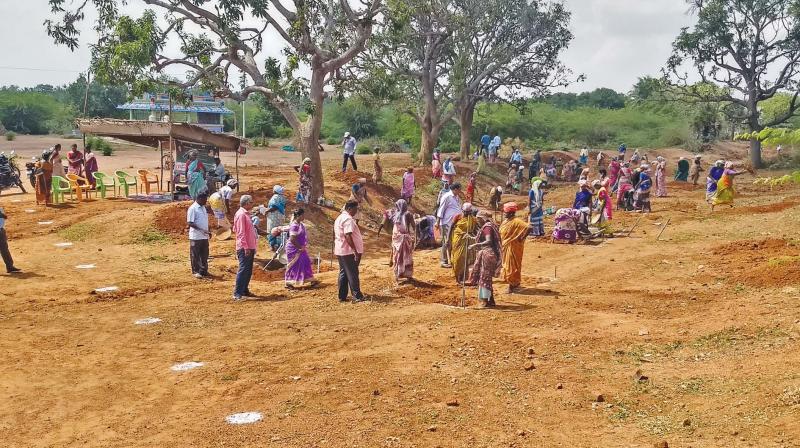Grain of truth

Thanjavur: Saroja (60) of Pillaiyarpatti was busy digging water absorption trench in a supply channel to a tank at Pillaiyarpatti near Thanjavur on Monday. Living with her only son, after her husband passed away, for Saroja, who is also a daily wage worker, the Mahatma Gandhi National Rural Employment Guarantee Scheme (MGNREGS) or popularly known as rural jobs scheme, is god send as she is assured of work and wages for 100 days in a year under it.
“This work is easy. We have to dig a trench two-ft into three-ft with a depth of two-ft. At the end of the day we get wages based on the work we have done,” she said.
K. Bhanumathi, mother of two daughters, who has lost her husband, is another MGNREGS card holder working in the site. She also endorsed that the scheme was a boon to her. Kuppusamy (65) is a lonely man without family. A resident of Pillaiyarpatti, his inclusion in MGNREGS helps him to eke out his livelihood.
Nearly 200 workers were working in the site which is a new kind of work taken up under MGNREGS. “The trenches are dug as a water conservation measure in the supply channel. Water will stagnate in these trenches and underground water will be recharged. The workers will be getting the work for two months in creating trenches to a distance of two-km in the supply channel, officials explained.
The amount allotted for the work is '1.96 lakh. Senthilkumar, a differently-abled person, also has been given work under the scheme. Sitting in his tricycle, he supplies drinking water to workers and their children. He maintains records also.
The social, economic and environment impact of MGNREGS in Thanjavur district is profound.
The flagship programme of the United Progressive Alliance (UPA) Government at the Centre with pressure from left parties who were alliance partners then, MGNREGS has taken various forms in the district depending upon the need.
The scheme was an instrument of mitigating drought in the year 2016-17. The district, rice bowl of Tamil Nadu, faced the worst ever drought in the past 140 years during 2016-17.
Officials said that MGNREGS came to the rescue of the people of the district in that year. “The district average rainfall for last 70 years is 1140.12 mm. During the year 2016-17, the total rainfall received was only 542 mms. The district received only 47.5 per cent of the total rainfall. “So agricultural activities totally failed and the farmers and agricultural workers were distressed. But MGNREGS showed the light at the end of the tunnel,” said officials.
“Totally 2, 30,853 families benefitted during the drought year. Another offshoot of the drought-proof activities taken in this year like water conservation works, afforestation etc., was felt in the next year, 2017-18. Area of paddy cultivation increased by 21,953 hectares in 2017-18 compared to the drought year of 2016-17. The district achieved additional production of 1.31 lakh tonnes of paddy during the year 2017-18,” A. Annadurai, Thanjavur district collector said.
“No death occurred due to drought during 2016-17 even though it is a severe drought, thanks to MGNREGS. The drought has acted as a main thrust to achieve highest man-days and highest expenditure turn out in last five years in Thanjavur district,” said the collector.
During 2016-17, 145.47 lakh man-days of work were created with an expenditure of '159.49 crore.”Work was given for 150 days in view of drought than the usual 100 days under the scheme,” the collector added.
New water conserving techniques are also tried under MGNREGS in Thanjavur district. Root zone irrigation technique introduced by Dr K. Satyagopal, principal secretary and commissioner of revenue administration, has been adopted in mass tree plantation in the district.
In this technique one third of quantity of water is saved compared with conventional method. “In conventional watering method, Kodukapuli plants will give yield after 2.5 years to three years. In this method it gives yield after 1.5 years,” said P. Mantrachalam, project director, DRDA.

